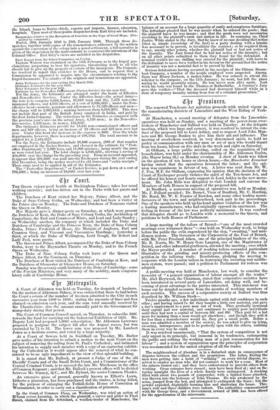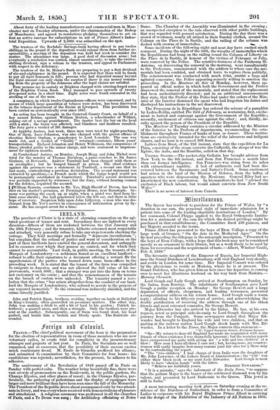'ji Vruttinrtg.
The renewed Ten-hours Act agitation proceeds with united vigour hi_ the manufacturing districts of Lancashire and the West Riding of York- • shire.
A large meeting of the tailors of Bristol—" one of the most crowded meetings ever witnessed there "—was held on Wednesday week, to bring before the public the evils engendered by the slop, "sweating," and mid- dlemen system. The Governor of the Corporation of the Poor of Bristol, with Mr. Peter Freeland Aiken, one of the principal bankers of the city, Mr. R. Norris, Mr. W. Henry Gore Langton, one of the Magistrates of Bristol, and other influential gentlemen, attended the meeting; over which the Mayor presided. A number of working tailors recounted particulars illustrative of the grinding and misery-producing effects of the com- petition in the tailoring trade. Resolutions, pledging the meeting to cooperate with the London tailors in destroying the sweating and middle- men system, were passed; and a petition to Parliament for redress was adopted.
A public meeting was held at Manchester, last week, to consider the necessity of "a general organization of labour amongst all the trades?' Mr. Abel Heywood, the Chairman, stated that cooperative societies have been introduced in several parts of Lancashire, are doing well, and be- coming of great advantage to the parties interested. This statement was borne out by detailed accounts from the mouths of working members of such societies. The success of a cooperative society at Salford was thus described by Mr. William Stork— Twelve months agot a few individuals united with full confidence in each - other • and having raised 78. 6d. they bought a little raw material, and gave a day's employment to a poor man out of work. They gradually increased. their capital and raw material, and continued to employ poor individuals until they had now a capital of between 50l. and 60/. They paid 5d. a hat more for making than a man would get elsewhere ; and though they sold it for less than a manufacturer would do, they got a small profit. Before a man was admitted a member of the society, he was asked to give up lying, swearing, intemperance, and to be perfectly open with the others, assisting them in every way he could.
It was resolved unanimously, "That the system of competition is not only unjust in its principle, but immoral in its tendencies, endangering the public and robbing the working man of just remuneration for his- labour " ; and a system of organization upon the principles of cooperation was recommended for the united adoption of all, the trades.
The neighbourhood of Aberdare is in a disturbed state in consequence of disputes between the colliers and the proprietors. The latter, finding the men were getting into a habit of " striking " on every trivial dispute, re- solved to employ no man who did not contract to work for a year. Most of the miners turned out ; and they have endeavoured to prevent others from working. Gross outrages have ensued; men have been fired at; and on Sa- turday Bennight the lives of a whole family were endangered. A stocking filled with about two pounds of gunpowder, with a lighted fuzee attached, was thrown into the bedroom of John Thomas. He was awakened by the noise, jumped from the bed, and attempted to extinguish the fuzee; but the powder exploded, frightfully burning bun and shattering the house. Tho- mas's wife and three children were unhurt. The authorities communicated' with Sir George Grey, and a Government reward of 2001. has been offered for the apprehension of the miscreants. At Manchester, a second meeting of delegates from the Lancashire , operatives was held on Sunday, and a meeting of the power-loom over- , lookers of Manchester and Salford was held on Tuesday. At the delegate meeting, which was large and earnest, it was resolved to intrust the con- duct of the proposed bill to Lord Ashley, and to request Lord John Man- ners and Mr. George Bankes to give him their aid and influence. The meeting of overlookers resolved, in very determined spirit, to hold no parley or communication with any man or set of men who would depart from ten hours, labour on five days in the week and eight on Saturday.
At Oldham, a large public meeting, called on the requisition of 745 householders, was held under the chairmanship of Mr. Alderman Taylor, (the Mayor being ill,) on Monday evening. A show of hands was taken on the question of ten hours or eleven hours,—the Manchester Examiner having stated that the operatives favoured the latter' and the opi- nion was unanimous in favour of ten. A letter was read from Mr. W. J. Fox, M.P. for Oldham, expressing his opinion that the decision of the Court of Exchequer grossly violates the spirit of the Ten-hours Act, and he offered his honest and hearty support to Lord Ashley in the new move- ment. Mr. John Mills was delegated to visit London and canvass the - Members of both Houses in support of the proposed bill.
At Bradford, a numerous meeting of operatives was held on Monday. Mr. T. Pollard presided; Dr. Burnet, Vicar of Bradford, Mr. C. Harding, Mr. Rand, Mr. W. E. Forster of Rawden, and many other leading manu- facturers of the town and neighbourhood, took part in the proceedings. ' One of the speakers who held up his hand against violation of the law was a leading manufacturer, who had originally opposed its enactment. The. feeling in favour of the law was perfectly unanimous. It was resolved' that delegates should go to London with a memorial to the Queen, and, petitions to both Houses of Parliament. About forty of the leading manufacturers and commercial men in Man- chester met on Tuesday afternoon, under the chairmanship of the Bishop of Manchester, and agreed to resolutions pledging themselves to set on foot an active canvass for subscriptions in aid of Prince Albert's Indus- trial Exposition. Upwards of 2,6001. was subscribed on the spot
The trustees of the Rochdale Savings-bank having offered to pay twelve abillings in the pound if the depositors would release them from further re- sponsibility, a meeting of the depositors was held last week to consider the matter. The attendance was large. A good deal of discussion arose; but eventually a resolution was carried, almost unanimously, to take the twelve- shilling dividend, sign a release to the trustees, and appeal to Parliament with respect to the deficiency.
The trustees of the St. Helen's Bank are preparing to pay a first dividend of six-and-eightpence in the pound. It is expected that there will be funds to pay all legal demands in full; persons who had deposited money beyond the legal amount can only claim the surplus if there- is any money remain- ing from the property of the Johnsons after the legal claims are satisfied.
Four persons arc in custody at Brighton charged with uttering forged notes of the Brighton Union Bank. They managed to pass upwards of twenty five-pound notes in a short time. Eight notes were found concealed in the stocking of one of the men.
A conspiracy, in which twelve Customhouse-officers were concerned, and by means of which large quantifies of tobacco were stolen, has been discovered in the tobacco department of the Excise at LiverpooL This peculation has been carried on systematically ever since 1847.
An action has been brought in the Cornwall County Court, on behalf of a boy. named Robins, against William Bmbyn, a schoolmaster of Withiel, arising out of a savage punishment. The master beat the boy on the head with a stick ; the bruin was affected, and blindness and deafness resulted. The Jury gave a verdict of 201. damages.
At Appleby Assizes last week, three men were tried for night-poaching. Johnston,One of them, Isaac was also charged with the graver offence of shooting Robert Orphan, a gamekeeper to Lord Lonsdale. The case was made out, and a verdict of " Guilty " returned—sentence, fifteen years' transportation. Richard Johnston and Henry Wilkinson, the companions of Isaac, pleaded guilty to the minor charge, and were sentenced to imprison- -ment for eighteen months.
At Cumberland Assizes, on Monday, Joseph Hogg and John Nichol were tried for the murder of Thomas Davidson, a game-watcher to Sir James Graham, at Beweastle. Andrew Turnbull had been charged with them as an accomplice ; but he hanged himself in prison. The chief evidence against the prisoners was a statement by Turnbull, a second one that he had made, contradicting a previous declaration. The second statement was extracted by questions,—a French mode which the Judge hoped would not be permanently established in Cumberland. Turnbull's second declaration was partially supported by witnesses; but the Jury, without hearing counsel for the defence, acquitted the accused.
I [William Symons, coachman to Mr. Yeo, High Sheriff of Devon, has been shot on his master's premises, at Fremington House, near Barnstaple. Sy- mons was putting the coach up at night, when a pistol was fired from be- hind some shrubs ; the ball penetrated below the left ear, and there is little 'hope of recovery. Suspicion falls upon John Lillycrop, a man who was dis- charged from Mr. Yeo's service in consequence of information given by Sy- mons. He has escaped arrest for a time.

























 Previous page
Previous page